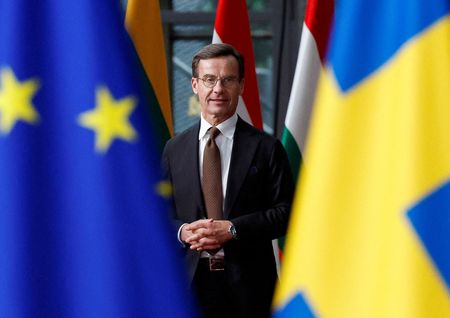 1
1 1
1

STOCKHOLM (Reuters) -Sweden’s prime minister on Friday urged people to use less electricity as cold weather drives up demand, although the grid operator Svenska Kraftnat said there were no imminent shortages despite temporary nuclear outages.
Across Europe, where temperatures are plunging, concern has mounted over whether energy supplies will be sufficient following the supply disruption caused by energy exporter Russia’s war on Ukraine.
“As it gets cold, the risks are simply much, much greater and the situation worsens even more today, literally speaking, when Sweden’s largest nuclear power reactor Oskarshamn 3 is shut down,” Prime Minister Ulf Kristersson told a news conference.
“Many Swedes have saved electricity for purely cost reasons. Now we want to ask the Swedish people to save electricity also to reduce the risk of power cuts,” he said.
Oskarshamn 3 has been switched off for maintenance until Dec. 18 and the Ringhals 3 reactor will operate at half capacity over the weekend.
Also last week, the Nordic country’s utility Vattenfall delayed the restart of Ringhals 4, which is shut for repairs, to Feb. 23.
Svenska Kraftnat said in a statement other power sources and imports can replace the lost production.
“We normally export a lot but we now see the benefits of being able to import via interconnectors linking us to other countries,” Pontus de Mare, head of systems operations at Svenska Kraftnat, said.
The assessment is that there is not a high risk of a power shortage in the near future, he said.
Sweden in August raised its risk assessment of shortages during the winter to “real” from “low”.
Energy Minister Ebba Busch told the news conference the likelihood of shortages would decrease substantially if consumers could use 2% less, or shift 2% of consumption to times outside the morning and evening peak hours.
“Every kilowatt hour counts,” she said.
In another setback to supply in the Nordic and Baltic region, neighbouring Finland on Friday again postponed the startup of a new nuclear reactor.
(Reporting by Stine Jacobsen and Anna Ringstrom, editing by Terje Solsvik, Kim Coghill and Barbara Lewis)